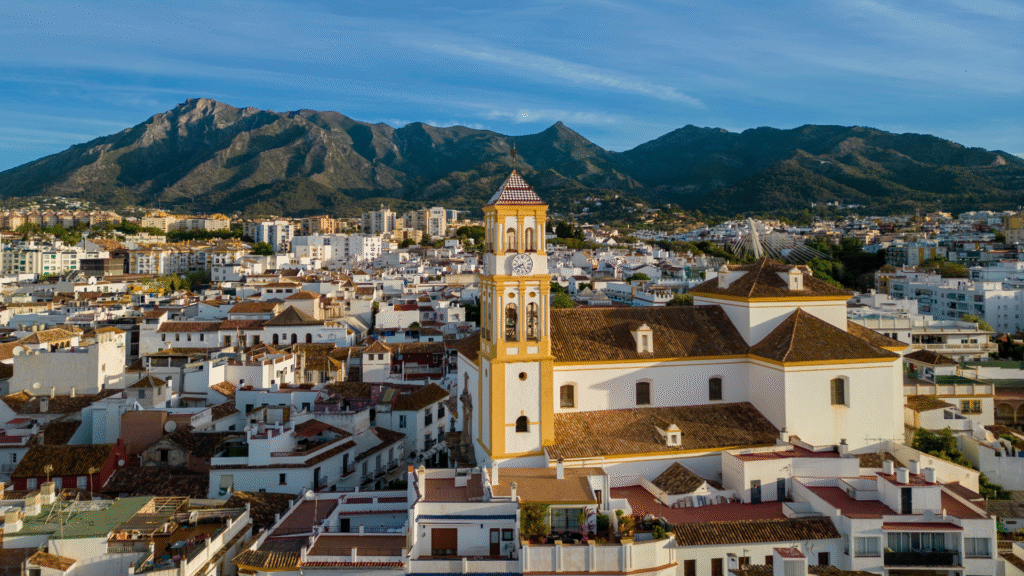Updated: 9 January 2026
Securing a Marbella property mortgage is an increasingly popular route for international buyers looking to invest in one of Spain’s most desirable coastal markets. With flexible lending options and strong support from Spanish banks, it’s easier than ever to finance your dream home or investment property in Marbella, particularly for those exploring real estate investment opportunities in southern Spain.
Why Are Mortgages in Marbella Attractive to Foreign Buyers?
Foreign buyers benefit from loan-to-value ratios of up to 70% for non-residents, allowing them to leverage their capital effectively. Marbella’s thriving international market means local banks are well-versed in processing overseas mortgage applications.
According to Quintessentia Property Advisors, over 40% of property purchases in Marbella involve mortgage financing, highlighting the strength and accessibility of the Marbella property mortgage sector and reinforcing confidence in the Marbella real estate market.
What Are the Basic Requirements for a Spanish Mortgage?
To qualify for a mortgage in Spain, applicants must provide:
-
Proof of income
-
Tax returns (past 1–2 years)
-
Bank statements (6–12 months)
-
Passport and NIE (Número de Identificación de Extranjero)
Lenders prefer that mortgage costs don’t exceed 35% of monthly income. Non-residents can finance up to 70% of the property value, while residents may access up to 80%. All documents must be translated into Spanish if issued abroad, which aligns closely with the legal requirements for buying property in Marbella.
Resident vs. Non-Resident Mortgages in Spain
Resident mortgages allow financing up to 80% of the property value, often with lower interest rates. Non-resident mortgages typically offer up to 70% financing with slightly higher rates. Residency is determined by spending over 183 days per year in Spain and paying local taxes, a distinction also explained in the legal requirements for non-residents buying property in Spain.
| Feature | Resident Mortgage | Non-Resident Mortgage |
|---|---|---|
| Loan-to-Value | Up to 80% | Up to 70% |
| Interest Rates | 3–4% | 3.5–5% |
| Term Length | Up to 30 years | Up to 25 years |
| Income Assessment | Local + international | International only |
Required Documents for Foreign Buyers
When applying for a Marbella property mortgage, banks generally request:
-
Passport copy
-
NIE number
-
Recent tax returns
-
Bank statements
-
Proof of income (salary slips or business accounts)
-
Disclosure of existing debts
Self-employed buyers must provide audited accounts and tax filings. According to CaixaBank, ensuring all documentation is translated and legalized can speed up approval by several weeks, especially for those following the process of buying real estate in Spain as a foreigner.
Deposit Requirements for Buying in Marbella
Non-resident buyers typically need a 30–40% deposit, plus taxes and fees. For a €1M property, expect to pay €350K–€400K upfront. Buyers should also budget an additional 10–12% for transaction costs such as transfer tax, notary, and registration fees, which are covered in detail under local taxes and fees associated with property ownership in Marbella.
Typical Mortgage Rates and Terms
As of 2024, Marbella property mortgage rates range between 3.5% and 5% for non-residents. Terms usually extend up to 25 years, and buyers can choose from fixed, variable, or mixed-rate mortgages. Many prefer fixed rates for stability in the luxury property segment, particularly when purchasing high-value homes in Marbella’s best areas to buy property.
| Type | Description | Popularity |
|---|---|---|
| Fixed Rate | Same rate throughout term | High |
| Variable Rate | Linked to Euribor | Moderate |
| Mixed Rate | Fixed for initial years, variable later | Growing |
How Banks Assess Affordability
Spanish lenders ensure mortgage payments do not exceed 30–35% of monthly income. Applicants must show stable income and healthy credit history. For international investors, banks review worldwide earnings and liabilities before approving a Marbella property mortgage, a process often linked to rental property investment opportunities in Spain.
Spanish Bank Account Requirement
Opening a Spanish bank account is mandatory to obtain a mortgage. It’s used for mortgage payments, taxes, and utilities. While some banks allow remote setup, most buyers finalize the account during their visit to Spain.
Mortgage Currencies
Most mortgages in Marbella are issued in euros. Some banks offer foreign currency mortgages (GBP, USD, CHF), though these carry exchange rate risks. Euro-denominated loans remain the most stable and preferred option.
Taxes and Fees for Spanish Mortgages
Borrowers should budget for:
-
Mortgage arrangement fee (≈1% of loan)
-
Valuation fee (€300–€600)
-
Notary and registration (€1,000–€3,000)
-
Home and life insurance (mandatory or recommended)
In addition, property purchase taxes range from 7–10% for resales or 10% VAT for new builds. Total upfront costs usually add 10–12% to the purchase price, which is also discussed in the steps involved in purchasing real estate in Spain.
Mortgage Approval Timeline
Mortgage approval takes roughly 4–6 weeks once documents are submitted. Delays are usually due to translation or legalization issues. Pre-approval letters strengthen purchase offers and help speed up notary signings, especially in competitive segments of the Marbella property market.
Mortgages for Non-EU Buyers
Non-EU citizens can also apply for a Marbella property mortgage. Spanish banks typically finance 60–70% of the property’s value for buyers from the UK, US, Middle East, or Asia. A strong income record and clean credit history increase approval chances, particularly for those asking can I get a mortgage in Spain as a non-resident?.
Role of Mortgage Brokers
Mortgage brokers simplify the process, negotiate better rates, and handle communication with banks. For international buyers, brokers are invaluable in navigating Spanish legal and financial systems and often work closely with luxury real estate agents in Marbella.
Selling a Mortgaged Property
When selling a property with a mortgage, the remaining balance must be cleared before transferring ownership. Some loans are portable, but most sellers simply repay the outstanding amount.
FAQ
Can I get 100% financing in Marbella?
No. Non-residents can finance up to 70% of the property value.
Do Spanish banks check foreign credit history?
Yes, they often review international credit reports and proof of assets.
Are interest-only mortgages available?
Generally, no. Spanish banks prefer repayment mortgages combining capital and interest.
Can I repay early?
Yes, but early repayment penalties (0.25–0.5%) may apply.
Is it easier to get a mortgage for new-build or resale property?
Both are financeable, though banks may prefer new-builds due to documentation clarity.
Do I need life insurance?
Home insurance is mandatory, and life insurance is often recommended.


